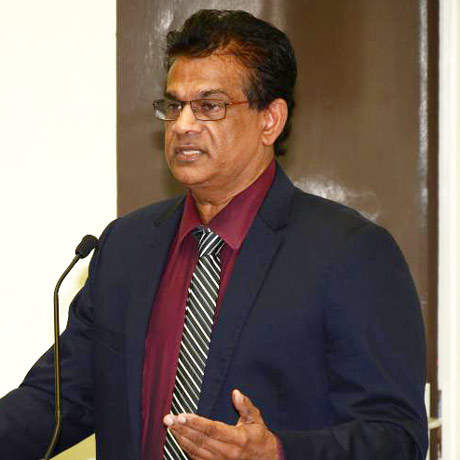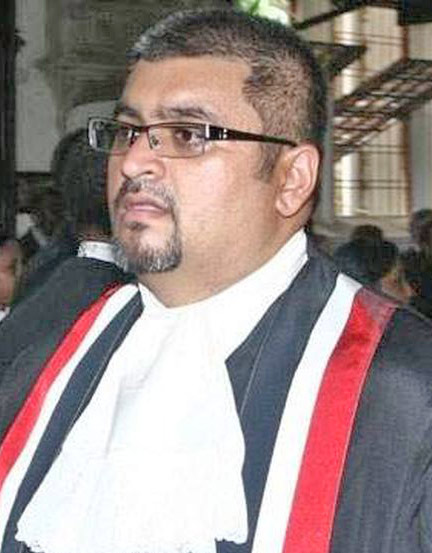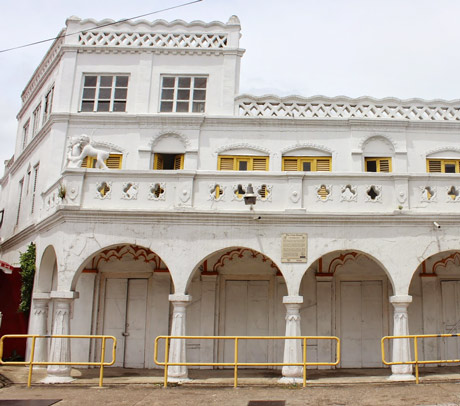Trinidad & Tobago
Faud Khan eats his words

Port-of-Spain – Former Health Minister Dr Fuad Khan last week issued an apology to Candice Santana for body-shaming her via social media. Following Carnival celebrations earlier this month, Santana complained she had been the recipient of verbal abuse and body-shaming over her weight while masquerading on the streets in Port-of-Spain during the two-day festival.
Khan’s Facebook response to Santana’s initial complaint was insensitive and calculated to body-shame. It caused an uproar, when on International Woman’s Day of all days, he labelled Santana as being a “TUB”, and accused her of promoting obesity in children. Remarkably, he also told her to “shut up and lose the weight”.
Following public outrage at his statements, Khan finally retreated, issuing an apology in a later Facebook post, saying, “I apologise to Miss Candice Santana for my insensitive remark of referring her to a “TUB.” I was harsh and very insensitive and I apologise to all those I have offended with that name calling. Please forgive me Candice if I hurt you. However, should you wish to hear my experience with the weight loss, please call me. I can also assist with any medical problem.”
Santana’s tribulations and public humiliation began following her Facebook post, and a subsequent television interview, where she detailed experiences of fat-shaming endured as a member of the Lost Tribe masquerading group on March 4-5, Carnival Monday and Tuesday. In the television interview, Santana reiterated that she was not promoting an unhealthy lifestyle, and encouraged people to treat each other with respect, since they were unaware of an individual’s personal health issues.
In his apology, Khan said he should have taken a different approach instead of name-calling, and again apologised to her and to “all those overweight people who felt offended”. He also noted he and Santana indirectly started a discussion about healthy lifestyles.
Khan then followed his post with yet another, posting a voice message admitting that he went “overboard”. Again, he apologised to Santana, and to overweight people, and to anyone else whom he had offended. Said Khan: “It was harsh and insensitive, yes. I got carried over trying to bring the point across… However, I do feel strongly about [non-communicable diseases], and I have seen the complications [how NCDs] affect very young people.”
However, it appears to have taken some convincing for Khan to change his mind, since he appeared to be unapologetic, and in fact, doubled down on his insensitive position. That he doubled down was evident in another post where he said people hated to hear the truth, and preferred to ignore the message and shoot the messenger. And in response to a statement about the matter from the PNM Women's League, Khan said he did not want to be “fat accepted”, and had no problem being told he had to lose weight.
Said Khan: “I am working out and have stopped stuffing my face. I will never insist that people love me up for being obese. I am happy when I am being fat-shamed by the PNM women league (FAB) as they are known. It makes me continue my weight loss path.”
However, it was not all an unprofessional absence of a soothing, reassuring bedside manner from Khan. He was also using his Facebook account to warn that fat and obesity killed, and to share information and statistics on NCDs. Khan noted more than half of Trinidad and Tobago’s adult population is now overweight or obese. He added chronic non-communicable diseases shared common risk factors including high blood pressure, high cholesterol, as well as behavioural risks as unhealthy diets, obesity, tobacco use, alcohol abuse, and physical inactivity.
He said CNCDs as heart disease, stroke, diabetes, and cancer, accounted for more than half of all deaths in Trinidad and Tobago and the Caribbean, and that it put a strain on public health facilities.
Following his public apology, Santana indicated she did not want to meet with Khan, noting the only authentic apology is changed behaviour. Santana told the media she humbly and respectfully declined Khan’s offer to meet with or obtain assistance, noting “the extent of damage done to me as a person”.
Said Santana in an online post: “The only authentic apology is changed behaviour and a commitment to such would mean much more. In my earlier statement, I said that I had forgiven Dr Fuad Khan, though great damage is already done and continue to myself and overweight persons. As an office holder, Dr Khan and all officials are held to a higher standard of operation, so even when passionate about an issue, the use of disrespect, embarrassment and personal attack to a citizen should never happen.”
She added: “As a society, body-shaming and malicious name-calling regardless of size, shape or shade should never be encouraged. Office holders are expected to set a better example for us, especially the youth and children of the nation.”
Said Santana: “I humbly and respectfully decline the offer to meet Dr Khan or his assistance at this time because of the extent of damage done to me as a person. As we all go about our daily lives, let’s make an extra effort to treat each other as we would want to be treated, with kindness and respect. Let us show love for people and for country. Let us move forward positively. Act justly, walk humbly and love unconditionally!!!”

Justice Ricky Rahim, presiding in the San Fernando High Court found the SWRHA liable in the case of Anita Espinoza.
On October 24, 2016, Espinoza’s pregnancy was full term and she went to the SFGH and was admitted to the maternity ward for a caesarean section. A topical agent was administered to her skin in preparation for the procedure. and as customary, a screen was placed to block her view of the surgery.
In court documents, Espinoza said, “About a minute or so had elapsed when I heard one of the defendant's agent and/or servant shout 'fire'. The screen that was previously obscuring my view of the said procedure fell and the defendant's agent and/or servant began shouting that I was on fire. I became alarmed and I was forced to look away. At that time I began to feel dizzy. An agent and/or servant of the defendant then replaced the screen while another put out the fire.”
An incision had already been made on Espinoza, who had to be administered oxygen as she began losing consciousness. She was later told that those attending to her treated her burns and the procedure was completed. She said she has not seen any explanation for how the fire happened or what caused it.
The SWRHA admitted that there was a fire and Espinoza was burnt. In its defence filed in May 2018, it said in preparation for the procedure, the method was in accordance with the best practice and its staff members acted within the general skill and competence of other professional medical staff in carrying out a similar procedure.
In her affidavit, Espinoza disagreed that the method followed was in accordance with best practice, “As I don't believe that best practice involves setting a patient on fire.”
In finding the SWRHA liable, Rahim ordered damages and costs be assessed by a master of the court. Espinoza was represented by attorneys Pavitra Ramharack and Brandon Sirju. Attorney Summer Sandy represented the SWRHA.

Lion House is the once-majestic white structure Naipaul made famous in his opus, A House for Mr Biswas. However, although it has undergone extensive restoration works in the past, it was abandoned following the death of attorney Surendranath Capildeo, grandson of Pundit Capildeo, the indentured labourer who built the house.
Regarded as an architectural treasure, the building is listed by the National Trust, and is considered to be of major historical significance in central Trinidad.
Last week Chaguanas Mayor Gopaul Boodhan and Tabaquite MP Suruj Rambachan, visited the building. While there they met Suruj Samuel, a homeless man occupying the front of the dilapidated doors. Samuel is one of several homeless persons now resident there. He stores his few possessions in cardboard boxes, and sleeps under the rotted wooden awning that could collapse at any time.
Rambachan said he was disheartened at the state of Lion House, and estimates it could collapse within two years unless urgent repairs are undertaken. Peeking through a crack in the wooden front doors held together by a rusty padlock into the interior of the building, Rambachan noted the floors have caved in, and there are signs of major water damage.
“I am very, very disturbed, disheartened, and depressed at what I am seeing happening to Lion House here in Chaguanas. This is one of the most tragic things I am seeing in my country at this point in time. The deterioration of this building says something about our value for our history and our ancestry,” he said.
Rambachan said he hopes the relevant authorities will conduct immediate repairs.
“If you cannot appreciate where you came from, you would never be able to build the kind of future that would be one our children can be proud of,” he said.
He recommended the building be acquired by the government and “restored with the same enthusiasm that was placed in the restoration of Stollmeyers Castle”.
Boodhan said since the property is privately owned there is very little the Chaguanas Borough Corporation can do apart from relocating the homeless now living under its collapsing roof.
Lion House was last restored in the early 1990s by Surendranath Capildeo. Local architect Colin Laird was retained to advise on and supervise the project, which was awarded to EWAC & Co. Ltd. Work then halted for a few years, in which time the building was vandalised. The project was restarted, with restoration completed in 2001. Capildeo bore all the costs for the repair.
In 2013, then-tourism minister Stephen Cadiz announced a master plan was being developed to transform Brechin Castle, Couva, into an East Indian heritage site, which included restoration of Lion House. He said a budget had already been formulated for the restoration work and discussions would be held with Capildeo.
However, following Capildeo’s death in 2016, the restoration of Lion House was abandoned.
Lion House meant different things to many people in its early history. It was the meeting place for travellers from all over Trinidad who were passing through Chaguanas. It was also an early community centre for the residents of Chaguanas and surrounding areas. It was a home for Hindu pilgrims, who would gather under the awning now occupied by the homeless man, Samuel. It is also believed marijuana was sold at Lion House, and was consumed beneath this awning before becoming an illegal drug.
